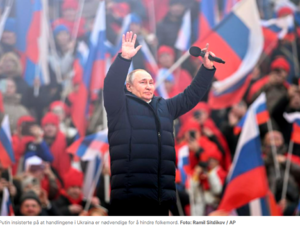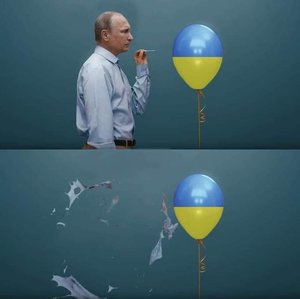FT nå nettopp:
Propaganda war rages as Russians face huge pressure to back invasion
Kremlin’s nationalist push is bigger than state-sanctioned euphoria that followed 2014 Crimea annexation, say analysts
As schoolchildren across Russia sat through compulsory lessons telling the Kremlin version of why Vladimir Putin’s forces invaded Ukraine, Moscow teacher Kamran Manafly wrote a post on Instagram on why he refused to put his students through “state propaganda”.
Within hours, the school’s headteacher called him to demand that he delete the post — then fired him when he refused. When some parents demanded that he be reinstated, the principal sent them pictures from Manafly’s Instagram feed showing the sacked teacher waving a US flag and called him an “agent of the west”, he said.
“Two years ago it was normal,” said the 28-year-old, who is considering leaving Russia over fears for his safety. “Now it’s like I’m an enemy of the people.”
As the war in Ukraine enters its fourth week, pressure is mounting on Russians to support it — or face consequences for speaking out against it.
Putin this week spoke of the need for Russia to “purify itself” by “distinguishing true patriots from scum and traitors” — language carrying echoes of Stalin’s purges in the 1930s.
The centre of Russia’s propaganda campaign is the letter Z that has become a symbol of Putin’s war after being painted on vehicles taking part in the invasion.
Many Russians, seduced by the rosy picture that state television paints of the invasion, have been keen to show their backing by affixing Z — the first letter in za, meaning “for” in Russian — on their cars and clothing.
State employees including teachers are asked to underline their support through apparently mandatory “flash mob” events, while pictures have circulated of young children holding up hand-painted Z signs or standing in a Z formation. Antiwar activists have found Z painted on their doors alongside more ominous warnings.
“They should have done this in 2014 but better late than never,” Igor Mangushev, a nationalist activist who was among the first to promote the letter online, said of the invasion. “Ukraine’s armed forces have been waging a terror campaign against [Russian speakers] for eight years,” he claimed.
Andrei Kolesnikov, senior fellow at the Carnegie Moscow Centre, said the Kremlin’s nationalist push was greater even than the state-sanctioned euphoria that followed the annexation of Crimea in 2014, which sent Putin’s ratings to record highs.
“It’s a ‘you’re either with us or against us’ campaign. There’s no way to be neutral,” he said. “It might happen through the education system or at work — you have to express your loyalty publicly. And if you don’t that means you’re against it. You’re a pariah. You don’t support Russia and the letter Z.”
As the propaganda battle raged, state-run pollster Vtsiom has claimed that 71 per cent of Russians back the “special military operation”. Hostility towards the west has risen sharply, according to the independent Levada Center, with 55 per cent of Russians disliking the US in February, compared with 42 per cent in November.
“It’s not joyful like it was during the Crimean campaign,” Kolesnikov said of the mood. “It’s very charged with negative emotions, harsh statements and a hardline stance on enemies.”
For the Kremlin, the patriotic campaign is a kind of loyalty test for Russian citizens. “Many are showing their essence, they’re traitors,” Dmitry Peskov, Putin’s spokesman, said on Thursday, speaking of those who did not support the war.
“Some quit their jobs, some leave active service, some leave the country . . . That’s how [Russia] is cleansed,” he said.
A Russian army truck painted with the letter Z passes through the town of Armyansk, Crimea © Reuters
About 15,000 people have been detained across Russia for protesting against the war. Police have charged a further 186 under a new law banning any “discrediting” of the armed forces or the spread of “fake news”, punishable in some cases with up to 15 years in prison.
The law has forced some of Russia’s few independent media outlets to close and others to stop covering the war. Marina Novikova, 63, who blogs on messaging app Telegram about life in her remote Siberian town, was one of the first to face criminal charges under the new law. She had just 170 subscribers when she was detained.
“They passed the law to scare people and snuff out the protests,” said Damir Gainutdinov, head of the Net Freedoms Project, an NGO that tracks the cases. “That’s why they put it into action so quickly.”
The reprisals have not ended there. Some Russians have reported being stopped in the street and asked to show their mobile phones, particularly on days when opposition leaders have called for protests in big cities.
One St Petersburg resident, invited to a job interview at a state museum in another city, was asked by management to show them the contents of her phone. She complied, but did not get the job.
Nika Samusik, a biology student, learnt last week that she was on a list of 13 people who were to be expelled from a St Petersburg state university after being detained at a protest — even though she went there to photograph it for a news outlet and said she complied fully with Russia’s onerous requirements to report on public events.
She has been detained before while covering previous protests and faced charges that were later dropped for photographing an art performance last year in Red Square, Moscow. Police informed her university this month that she had been convicted, she said — even though her case had yet to go to court.
“They won’t let me work and won’t let me study now either. I don’t know what to do,” Samusik said.
Samusik’s friends, mindful of police searches at other journalists’ homes, were urging her to consider leaving the country, she said. But unable to afford the astronomical price of a ticket to one of the 15 countries where Russians can still fly directly, Samusik said she had stopped making plans for the future.
“I’m a bit desperate and bewildered. And I’m in denial about what’s happening,” she said. “I don’t see any light at the end of the tunnel. Things are only going to get worse.”
Yet for Mangushev, the nationalist activist, opponents of Russia’s war were getting their just deserts. “You can’t call for your army to be defeated,” he said. “That should be treated harshly.”

 www.vg.no
www.vg.no









